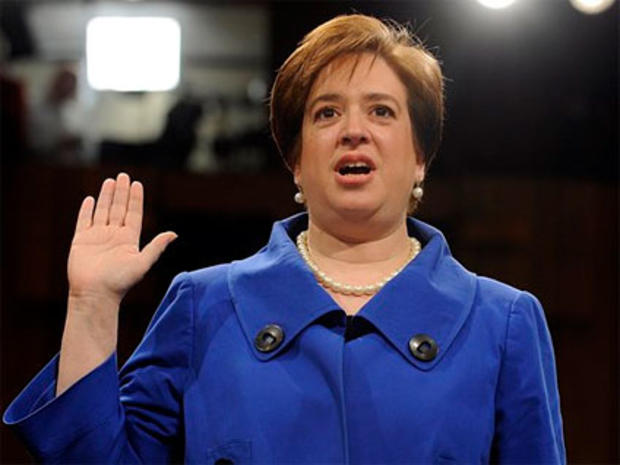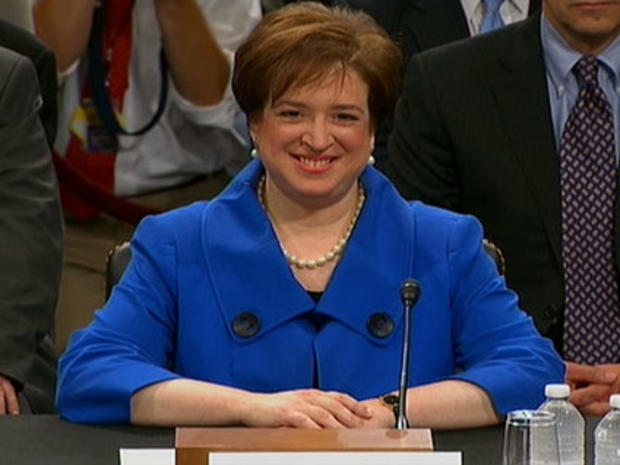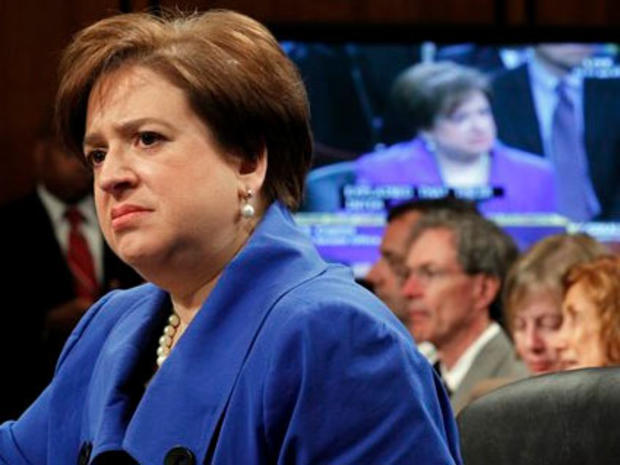SCOTUS Hearings Live Blog: Elena Kagan Day 1
The Senate Judiciary Committee today kicks off confirmation hearings to consider Solicitor General Elena Kagan's nomination to the Supreme Court. The Hotsheet will liveblog the events here.
Pictures: Kagan Confirmation Hearings
Excerpts: Kagan's Opening Statement
Jan Crawford: GOP Poised for a Fight
Special Report: Elena Kagan
4:05 p.m.: Kagan began her opening statement by honoring the memory of her parents, immigrants she said taught her of the value of the opportunities afforded to Americans.
She also said that if confirmed, she would only be sorry she would not have the privilege to serve with Justice Stevens, whom she would replace. Kagan also paid her respects to Justices Sandra Day O'Connor and Ruth Bader Ginsburg who "created boundless possibilities" for women in law.
Kagan said she can only pledge this week to remember the lessons she has learned in all of her prior experiences.
"I will listen hard, to every party before the Court and to each of my colleagues," she said. "I will work hard. And I will do my best to consider every case impartially, modestly, with commitment to principle, and in accordance with law."
As dean of Harvard Law School School, Kagan said she became familiar with a motto given to graduating students: That they are entering a profession devoted to "those wise restraints that make us free," a motto she said is appropriately applied to the work of the Supreme Court.
Kagan said work as a clerk for Justice Thurgood Marshall taught her that the Supreme Court should be the court "most open to every American."
"The idea is engraved on the very face of the Supreme Court building," Kagan said, gesturing with her hands to make her point, "Equal Justice Under Law."
Her experience in other branches of government, Kagan said, taught her the Court must pay deference to the decisions of the American people and their elected representatives.
"What I most took away from those experiences was simple admiration for the democratic process," she said. "The Supreme Court, of course, has the responsibility of ensuring that our government never oversteps its proper bounds or violates the rights of individuals. But the Court must also recognize the limits on itself and respect the choices made by the American people."
As an educator, she said, "what I've learned most is that no one has a monopoly on truth or wisdom."
The day's hearing came to a close after Kagan's statement.
A White House officials tells CBS News that President Obama invited Kagan to stop by the Oval Office this morning before heading to Capitol Hill so that he could offer his encouragement and wish her good luck.
3:50 p.m.: Sens. John Kerry (D-Mass.) and Scott Brown (R-Mass.) were the first to testify on behalf of Kagan's nomination.
"I'm glad that in these next days you'll get the chance to know Elena as so many of us have in Massachusetts," Kerry told the committee, "as an extremely capable public servant well grounded in the Constitution, and committed to the values we all share as Americans."
As an official in the Clinton White House, Kagan was often the person who helped Congress develop legislative compromises, Kerry said.
"It was classic Elena," he said. "She saw a path forward when most folks saw nothing but deadlock... She had a knack for knowing how to win people over."
As dean of Harvard Law School, Kagan "transformed it into a cohesive institution," Kerry said.
Going through Kagan's lengthy resume, Brown said, "Ms. Kagan is undoubtedly a brilliant woman who has served her country in a variety of capacities."
3:35 p.m.: Keeping on the Democratic message, Sen. Al Franken (D-Minn.) blasted the conservative block in the Supreme Court for voting in favor of corporate interests.
"With few exceptions, whether you're a worker, a pensioner, a small business owner, a woman or a person who drinks water, your rights are harder to defend today than they were five years ago," he said.
He urged Kagan to take up the role of retiring Justice John Paul Stevens, who often lead the dissent in pro-business cases.
3:25 p.m.: Continuing with Democrats' insistence that the Supreme Court currently sides too often with business interests over citizens, Sen. Ted Kaufman (D-Del.) said he plans to spend the bulk of his time asking Kagan about the Court's business cases.
The working majority is pro-business to a fault," he said.
Current decisions, Kaufman said, are at odds with the most recently-confirmed justices' testimony that they respect and are committed to upholding precedent.
"The respect seems to vanish whenever it interferes with the desire of a pro-business outcome," he said.
3:15 p.m.: Sen. Amy Klobuchar (D-Minn.) emphasized her interest in seeing a justice added to the Court who would raise "real world points" in cases.
"I'd like to see a Supreme Court justice who is able to go into the backroom... and bring some real world perspective," she said. "The cases you hear involve real people with real problems looking for real remedies."
3:05 p.m.: After the break, Sen. Sheldon Whitehouse (D-R.I.) resumed Democrats' criticisms of the conservative "judicial activism" of the current Supreme Court, urging Kagan to temper their rightward shift and preference for corporate interests if she is confirmed.
The Citizens United case opened the democratic system to a "massive new threat of corruption," Whitehouse said, after citing a number of other 5 to 4 decisions that Democrats say favored corporations over citizens.
Citing Exxon v. Baker, which reduced the economic damages Exxon owed to Alaska after the Exxon Valdez oil spill by 90 percent, Whitehouse said one can't help but wonder how BP would have behaved in the Gulf of Mexico "if the corporation didn't know the Supreme Court had its back."
2:40 p.m.: Sen. Ben Cardin (D-Md.), like other Democrats, criticized the current Supreme Court for siding with corporate interests over citizens.
Leahy adjourned the committee for a break.
2:30 p.m.: Sen. Tom Coburn (R-Okla.) urged Kagan to "set a new standard" for Supreme Court nomination hearings "in which you really answer questions."
The real measure of a successful nominee, Coburn said, is not what he or she says in front of the committee, but "whether or not they've gained or lost the confidence of the vast majority of Americans."
2:25 p.m.: After Schumer and Cornyn gave opposite interpretations of "judicial activism," Sen. Dick Durbin (D-Ill.) gave another argument for Schumer's case that the term applies to the rightward shift of the Court.
Citing the Citizens United case, Durbin said, "If that isn't judicial activism, what is?"
Durbin also chided his Republican colleagues for saying critically that Kagan could be a judge in the mold of Justice Thurgood Marshall, for whom she clerked.
"America is a better nation because of the... values of Thurgood Marshall," he said, adding that Marshall served as an example of applying empathy in the court.
"His feelings became a part of his passionate life's work, and I say, thank God," Durbin said. He cited the most famous case Marshall argued before the Supreme Court, Brown v. Board of Education. "If that is an activist mind at work, we should be grateful as a nation," Durbin said.
2:15 p.m.: Sen. John Cornyn (R-Texas) cited the Supreme Court's decision today, which uphold Americans' right to own a gun for self-defense anywhere they live and casts doubt on handgun bans in the Chicago area, as an example of judicial activism.
The four justices who voted in the minority, he said, took the activist approach of relying on public policy arguments. By contrast, he said, the majority appropriately relied on history and precedent in their decision.
It's imperative to know, Cornyn said, "Will the nominee enforce the written Constitution and not invent new rights?"
2:10 p.m.: Kagan will "moderate a Court veering out of the mainstream," Sen. Chuck Schumer (D-N.Y.) said, blasting the current Supreme Court for its rightward shift under Chief Justice John Roberts.
"Judicial activism now has a new guise," he said, "Judicial activism to pull the country to the right."
Increasingly, Schumer said, the Court favors special interests over citizens. He called Kagan a "terrific antidote" to the "lack of real world, practical understanding" of the Court.
2 p.m.: Kagan brings "a little of this and a little of that" to the hearings, Sen. Lindsey Graham (R-S.C.) said. Some of her work as solicitor general "merits praise," he said, while he does not agree with all of her decisions as dean of Harvard law.
"Theres no doubt in my mind that you're a liberal person," Graham said. "But that's just America. It's okay to be liberal; it's okay to be conservative."
But when it comes time to be a judge, he said, you have to understand the limits of those views.
Graham, like others, questioned her admiration of former Israeli Chief Justice Aharon Barak, who Graham called "an interesting guy." He said Kagan will have "a lot of explaining to do" about her remarks regarding Barak.
Graham said that, "if at the end of the day you think more like Justice Marshall than Justice Rehnquist, than so be it" -- as long as she is not trying to channel her political allies in her decisions.
1:45 p.m.: Sen. Jon Kyl (R-Ariz.) critically said there are "warning signs" that Kagan is exactly the type of "results-oriented" nominee that he said President Obama would like on the Supreme Court to advance his political agenda.
Mr. Obama has altered his "empathy standard" for nominees to say instead that judges should consider the day-to-day consequences of their decisions. The clear implication, Kyl said, is "in some cases judges should abandon impartiality."
Perhaps the president wants the Court to ignore questions surrounding some of his legislation, Kyl said, or "advance progressive goals that have been stalled in the political process."
Like some other senators before him, Kyl pointed to Kagan's admiration of former Israeli Chief Justice Aharon Barak, whom Kyl said took an "activist approach" to judging.
Kyl also criticized Kagan for showing "naked poltiical judgement" as a judicial clerk.
He blasted her for, in her role as solicitor general, urging the Supreme Court to strike down an Arizona law that cracks down on employers who hire undocumented workers.
Her recommendation, he said, "flies in the face of the plain language of the law" and was likely "motivated by political influence wtihin the White House." The Supreme Court today announced it will consider the case.
1:35 p.m.: Sen. Russ Feingold (D-Wisc.) praised the nomination of another woman to the Supreme Court, noting that women are making up an increasingly larger portion of law students. He said he would like to see nominees with more geographical diversity, given that Kagan will add to the number of justices from the Northeast.
Feingold blasted the Supreme Court's recent Citizen's United decision, which he said "uproots longstanding precedent" with respect to campaign finance law.
"The public's confidence in the Court can't help but be shaken" when it ignores precedent in such a manner Feingold said.
With its decision, "the Court badly damaged its own integrity" and "damaged our democracy," he added.
If Kagan is confirmed, Feingold said he hopes she will "consider the reputation of the Court as a whole" in such decisions and convince her colleagues to do the same.
1:25 p.m.: Sen. Chuck Grassley (R-Iowa) noted Kagan's "accomplished academic and policy background" but said the committee lacked substantive evidence that Kagan could transition from a "political operative" to a "fair and unbiased jurist."
"Answering our questions in a candid and forthright manner will hopefully fill that void," he said.
Because of her lack of judging experience, it's even more critical the committee is "convinced you have the most important qualification of a justice," Grassley said, "to set aside your personal feelings and beliefs."
Sessions Calls Out Kagan's "Personal Agenda"
GOP Filibuster for Kagan Confirmation?
Kagan in the Hot Seat
Blog Posts on the Hearing from CBS Chief Legal Correspondent Jan Crawford
Follow Jan Crawford on Twitter
1:20 p.m.: Sen. Dianne Feinstein (D-Calif.) told Kagan she is "eminently confirmable" and a "very strong nominee."
The biggest criticism of Kagan's nomination, she said, has been her lack of experience, which Feinstein said she considers "refreshing."
Kagan, she said, "has shown determination to updhold the law even when she may personally disagree with it." Feinstein cited Kagan's decision to ultimately follow a ruling allowing the military to recruit on Harvard's campus in spite of her opposition to the "don't ask don't tell" law.
Feinstein, like other senators, noted that Kagan once wrote that Supreme Court nominees should be more open about their views and judicial philosophy and said she looked forward to a "meaningful discussion."
1:10 p.m.: Sen. Orrin Hatch (R-Utah) kicks off his remarks by noting the death of Byrd and the death of Supreme Court Justice Ruth Bader Ginsburg's husband, Martin Ginsburg. Harch said Byrd was a "towering presence in the Senate for decades."
Hatch said Kagan's lack of judicial experience is not enough for him to oppose her nomination. However, he added he will judge her "on the basis of evidence, not on blind faith."
While there have been many other nominees without judicial experience, the senator said, those nominees had on average decades of experience as a lawyer, which Kagan does not have.
There are many questions about Kagan that must be answered Hatch said, such as, "Will the Constitution control her, or will she try to control the Constitution?"
"Does she believe it is valid for judges to mold and to steer the law to achieve certain social ends?"
1 p.m.: Sen. Herb Kohl (D-Wisc.) notes that the committee has less evidence on what sort of judge Kagan will be than for any other nominee in history.
We do have a right to understand your judicial philosophy," he said. "This hearing is the only opportunity for the American public to learn who you are. They deserve to learn about your views."
The nominee, Kohl said, should have a sense of compassion -- which, he said, "does not mean bias or a lack of impartiality."
Compassion is "about the real problems that will shape the fabric of American life for years to come," he said.
12:50: Sen. Jeff Sessions of Alabama, the leading Republican on the committee, joins Leahy in noting their sadness over the death of Sen. Robert Byrd this morning.
He goes on to say he has "serious concerns" about Kagan's nomination, which he says is particularly concerning "in wake of one of the largest expansions of federal power in history."
Kagan's career "has been consumed more by politics than by law," he said, adding that Kagan has less real legal experience than any Supreme Court nominee in at least 50 years.
He noted her role in controversial political decisions, such as her opposition as Harvard Law School dean to military recruitment on campus. He also said Kagan's tenure as President Obama's solicitor general has also "not been without controversy."
"Americans want a judge that will be a judge on government overreach, not a rubber stamp," he said.
12:30 p.m.: Senate Judiciary Committee Chairman Patrick Leahy has gaveled the hearings to order.
Leahy said he urges Kagan to engage with the committee and the American people "in a constitutional conversation" about the role of courts and the meaning of the Constitution.
He also urged his colleagues to be fair in their scrutiny of Kagan.
"I reject the ideological litmus test from either the right or the left," he said, adding he is confident Kagan's judicial philosophy is "well within the legal mainstream."



